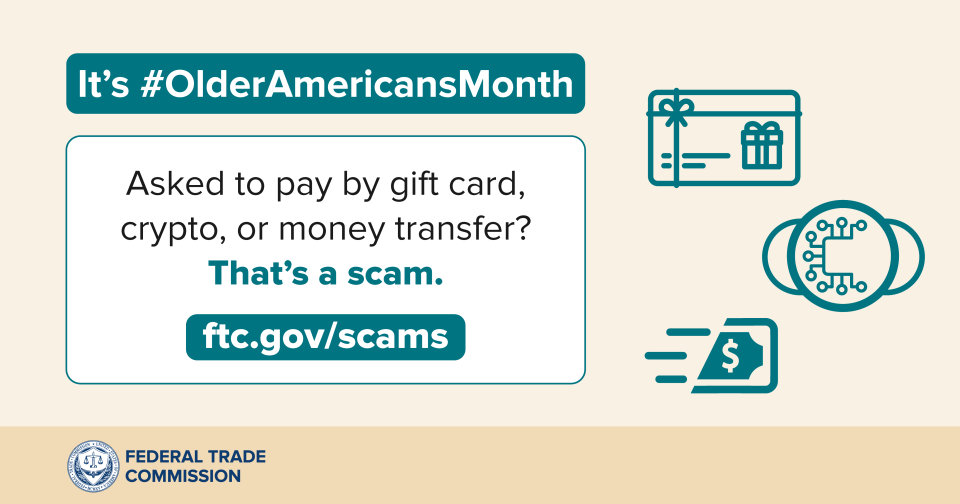Scammers use lots of different tactics — stories about grandchildren in distress, million-dollar prizes, a romantic future, or a business deal — to try to steal peoples’ money. Scammers may demand payment by wire transfers, gift cards, and cryptocurrency — methods that transfer funds quickly and anonymously.
During Older Americans Month, the Consumer Financial Protection Bureau and the Federal Trade Commission are partnering together to help older adults and their families and friends know what to do if someone demands payment by these methods, and where to report fraud.
To protect against scams and fraud
- Don’t wire money. Wiring money is like sending cash. Once you send it, you usually can’t get it back. Don’t wire money even if someone sends you a check, tells you to deposit it, and wire some of the money back to them. That’s a fake check scam, and the bank will want you to repay the money you withdrew and sent. That may also be a money mule scam that will involve you in moving stolen money.
- Don’t pay with a gift card. Gift cards are for gifts. As soon as you tell someone the numbers on the back of the gift card, they get control of the card and your money is gone forever. No legitimate business or government agency will insist that you pay with a gift card.
- Don’t pay with cryptocurrency. If someone requires you to pay for something with Bitcoin, Ether, or some other type of cryptocurrency, they’re probably a scammer. Cryptocurrency payments don’t come with legal protections. If you pay with cryptocurrency, you usually can’t get your money back unless the person you paid sends it back.
- Report fraud to the FTC. If you’re contacted by someone telling you to pay or send money using these methods, please tell the FTC about it at ftc.gov. The information you share can help protect your community from fraud, scams, and bad business practices.
Learn more about recognizing and avoiding scams that affect older adults from Money Smart for Older Adults and Pass it On.


It is your choice whether to submit a comment. If you do, you must create a user name, or we will not post your comment. The Federal Trade Commission Act authorizes this information collection for purposes of managing online comments. Comments and user names are part of the Federal Trade Commission’s (FTC) public records system, and user names also are part of the FTC’s computer user records system. We may routinely use these records as described in the FTC’s Privacy Act system notices. For more information on how the FTC handles information that we collect, please read our privacy policy.
The purpose of this blog and its comments section is to inform readers about Federal Trade Commission activity, and share information to help them avoid, report, and recover from fraud, scams, and bad business practices. Your thoughts, ideas, and concerns are welcome, and we encourage comments. But keep in mind, this is a moderated blog. We review all comments before they are posted, and we won’t post comments that don’t comply with our commenting policy. We expect commenters to treat each other and the blog writers with respect.
We don't edit comments to remove objectionable content, so please ensure that your comment contains none of the above. The comments posted on this blog become part of the public domain. To protect your privacy and the privacy of other people, please do not include personal information. Opinions in comments that appear in this blog belong to the individuals who expressed them. They do not belong to or represent views of the Federal Trade Commission.
Is this a scam ? I got this text
Legal Notice of Claims Process: To learn more about Federal Trade Commission v. On Point Global claims process, visit ftc.gov/OnPointBenefits
In reply to Is this a scam ? I got this… by Bridgette Peleberg
People who were tricked into putting their personal information into websites run On Point Global can apply to get a payment. The payments are available because of an FTC lawsuit and judgment against On Point Global.
The deadline to apply for a payment is July 17, 2022. Learn more from this FTC page: www.ftc.gov/onpointbenefits.